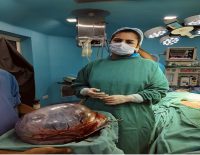‘Needs policy-makers intervention not model’s fake death for Cervical cancer advocacy’

Cervical cancer is a culturally sensitive disease given its transmission through the sexual route and all state stakeholders including Policy makers have a critical responsibility to raise awareness on Cervical cancer, Dr Abhishek Shankar has argued in the latest lancet commentary on right communication strategies for a culturally sensitive cervical cancer. He said that the initiative must not be restricted to the cervical cancer awareness month in January, but discussion must be held throughout the year.
As Indian model Poonam Pandey faked her death to create awareness on Cervical Cancer, Dr Shankar in his paper has argued that as cervical cancer is not known to cause sudden deaths, her deceitful attempt to raise awareness about cervical cancer awareness by faking death garnered significant attention, overshadowing the much-needed discussion that needs to be held in the media and by the public about the plight of women and their families being devastated by this disease.
Along with other Co-writers, Dr Shankar said that even though, there are more than 1.27 lakh reported cases of cervical cancer and approximately 80,000 deaths among women reported in 2022 in India, awareness of this disease at the ground level remains alarmingly low. Cervical cancer is a culturally sensitive disease given its transmission through the sexual route and all state stakeholders i.e. Gynaecologists, Oncologists, Policy makers, Media, and NGOs have a critical responsibility to start initiating more discussion throughout the year not only restricting to the cervical cancer awareness month in January.
“Effective cancer awareness demands evidence-based strategies, and achieving awareness goals cannot hinge on the tragedy of one person’s fake death (especially in such a fast-paced news cycle) This prompts reflection on the need for interventions in public awareness, that are sustainable in the long term and extend beyond the realm of misinformation campaigns”, Dr Shankar has argued.
The last time there was such significant attention given to the disease was in 2009 when the India-IARC multicentre study was abruptly stopped due to seven unrelated deaths in HPV vaccination demonstration projects in India. The India- IARC trial was a landmark study that provided the World Health Organisation (WHO) with robust evidence, prompting consideration for a change in the dosing schedule from three doses to one or two doses. This change had the potential to extend vaccine coverage to hundreds of thousands of girls in the target age range.
“Cervical cancer is a preventable and treatable disease, yet it continues to affect women worldwide, particularly in underserved communities where access to healthcare is limited. To change the situation at ground level, there is a need of multifaceted strategies to address the root causes and solutions for this pressing issue. Advocacy efforts should prioritise spreading accurate information about regular screenings, HPV vaccination, and lifestyle choices that can reduce the risk of developing this disease”, said Dr Shankar.







